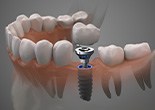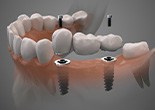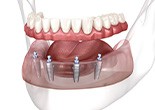Dental Implants — Phoenix, AZ
Repairing Damaged Smiles to Flawless Function
If you need to replace one or more teeth, Bell Road Dental Care of Phoenix has a great solution. With dental implants, you can have a fully restored smile that looks beautiful and functions just like your natural smile. Dental implants in our Phoenix dental office are versatile enough to be used by patients who need to replace a single tooth, patients who need to replace a few teeth, and even those who need to replace a full row of teeth. To learn more about this modern tooth loss solution, continue reading or give our office a call today!
Why Choose Bell Road Dental Care of Phoenix for Dental Implants?
- Known for Providing Outstanding Customer Service
- Trained to Place and Restore Dental Implants In-House
- Advanced Technology for Planning Implant Surgery
What Are Dental Implants?

A dental implant in Phoenix is a preferred solution to treat tooth loss because it is unlike any other option. It’s the only treatment to replace both the root and the crown of the tooth using a unique process. Although it may take longer than traditional methods, it’s time well-spent to enjoy a close replica of your natural teeth. It will require a multi-phased treatment, but don’t worry. Dr. Jafari will take the time to explain each step of your treatment and how dental implants work during your consultation.
The 4-Step Dental Implant Process

Dental implants involve a more intensive placement process than dentures and dental bridges. Going through the steps of receiving these remarkable artificial teeth takes several months, and, while this might seem like a long time, it produces remarkable and long-lasting results that make the time and effort worth it. The team at Bell Road Dental Care of Phoenix is proud to provide the whole dental implant treatment in our office so patients won’t have to worry about dealing with an outside specialist. While each dental implant patient will have a unique treatment plan, they can all expect to go through the four main steps of consultation, surgery, osseointegration, and delivery of the final restoration.
Initial Dental Implant Consultation

During your consultation, our dentist will go over your oral health and medical history to determine if you can be a good candidate for dental implants. If you aren’t ready for implants yet, you may be able to be able to receive them later after undergoing preliminary procedures such as gum disease treatment, bone grafts, or tooth extractions. Once you are ready, we can develop an appropriate treatment plan and walk you through the associated timeline and what you can expect to pay.
Dental Implant Surgery

Unlike many dental offices, our office is equipped to perform the entire dental implant placement surgery in-house, which means that you won’t have to worry about working with an outside specialist who uses a different pricing scale. The procedure begins with our dentist administering a local anesthetic to ensure that you stay comfortable before they make a small incision in your gums, place the implant in the jawbone, close the surgical area, and place a protective cap upon the post.
Dental Implant Osseointegration & Abutment

Osseointegration is the natural process by which the titanium post of your dental implant fuses with the jaw’s bone tissue, creating a sturdy hold that allows it to work just like a real tooth and last for a lifetime with excellent care. It takes several months to complete the osseointegration process, after which you will receive a small surgery to place abutment pieces on top of your implants. While you are healing from this procedure, a skilled technician will craft your final restorations based on impressions taken of your mouth.
Delivery of Dental Implant Restoration(s)

When your final restoration is complete, you’ll come back to our office to have it placed. This restoration can take the form of a dental crown, bridge, or denture depending on how many teeth are missing, and we’ll make sure that it sits comfortably within your bite before we send you on your way to enjoy your new smile.
Benefits of Dental Implants

More than half a million dental implants are placed every year, making them one of the most popular ways to replace lost teeth. Their unique placement inside the jawbone allows them to provide a wide range of benefits that can dramatically enhance a patient’s quality of life in ways that traditional restorations like bridges and dentures cannot match. Here’s a brief list of some of the ways dental implants from Bell Road Dental Care of Phoenix can improve your oral and overall health, confidence, and daily life.
Day-to-Day Benefits

Dental implants can significantly improve your day-to-day life in ways such as:
- Enhanced chewing ability allows patients to take more pleasure in eating by enjoying any foods they like.
- Only requiring the same oral hygiene measures as real teeth such as brushing, flossing, using antibacterial mouthwash, and seeing us regularly for exams and cleanings.
- Completing a patient’s smile so they can grin confidently at work and in social situations, which can make them seem friendlier, more confident, more trustworthy, and more approachable to others.
- Allowing a patient to speak without fear of their restoration slipping out of place or falling out of their mouth in the middle of saying something, which can result in much embarrassment.
Health Benefits

Dental implants also offer a few significant perks for a patient’s oral and overall health such as:
- Improving diet by allowing a patient to enjoy the wide variety of foods the human body needs to stay healthy and strong.
- Preventing the neighboring teeth from shifting out of place, which can make them harder to clean, easier to injure, and more prone to infection.
- Not causing injuries such as gum sores or dental damage due to a poorly fitting appliance sliding about the mouth.
- Requiring a simple and easy oral hygiene regimen to prevent destructive oral infections.
Long-Term Benefits

Dental implants can provide remarkable benefits in the long term as well. These include:
- Providing the exercise the jawbone needs to stay strong so it doesn’t atrophy and leave the mouth with a withered and sunken appearance.
- Boasting a 95% success rate even after ten years, making implants a sound investment that is likely to pay significant returns.
- Not needing periodic replacements like dentures or dental bridges do, which can save a patient thousands of dollars over the decades.
- Giving the patient the confidence they need to make a solid first impression, which can make it much easier to meet people, close sales, or land a job or a juicy promotion. This can result in exciting new social engagements or lucrative professional opportunities.
- Lasting for a lifetime if they receive excellent care.
Who Dental Implants Can Help

Regardless of how many you have remaining, potentially anyone who has lost permanent teeth can get dental implants. However, that doesn’t make them the best solution for everyone’s unique circumstances. You’ll need to schedule a consultation with one of our providers to ensure you’re a good candidate before we can proceed.
Continue reading to learn more about who dental implants can help, and feel free to contact us for additional information.
Who Is a Good Candidate for Dental Implants?

Getting dental implants involves a surgical procedure, so before we can approve you to move forward, we’ll need to examine your dental condition and update your medical history. Typically, we look for three primary characteristics when considering patients for dental implants:
- Good overall health. Your body must be able to undergo the procedure safely and recover effectively afterward.
- Excellent oral health. If we find problems like cavities or gum disease, we must address those first. Otherwise, they could interfere with your results or cause implant failure.
- Sufficient jawbone density. After tooth loss, your jawbone begins to thin. If it’s grown too weak, you may need a bone graft to bulk it up to receive dental implants.
If you’re not a good candidate immediately, don’t lose hope! In many cases, additional services like fillings, root canals, or gum disease therapy may be required. Once your mouth is healthy, we can proceed with one of the following options for your restoration.
Missing One Tooth

If you’re only missing one tooth, we can surgically insert a single implant post directly into your jaw. As you recover, this rod fuses with your bone in a process known as osseointegration. When that’s complete, we’ll provide a lifelike dental crown to cap it and refill the empty space left behind.
The result is a resilient replacement tooth that functions as a sturdy standalone structure that doesn’t rely on your surrounding teeth or gums to remain in place. With it in place, you can enjoy eating, speaking, and smiling much more confidently.
Missing Multiple Teeth

We can offer a different solution for patients with larger gaps in their grins from several missing teeth in a row. In these instances, two implant posts can be placed on either side of the space to anchor a specially designed dental bridge that contains the correct number of pontics (artificial teeth). Unlike traditional dental bridges, there’s no need to remove enamel from healthy teeth to support your prosthetics.
Missing All Teeth

Those who have lost all their natural teeth or are frustrated by ill-fitting dentures might do best with implant dentures. This involves strategically inserting 4 to 6 rods in your jawbone to support a full set of dentures. Instead of relying on a firm suction against your gums, your restoration is ‘permanently’ held in place by your implants, so it’s less likely to fall out. This allows us to rebuild one or both arches of teeth as well as protect and preserve your jawbone and facial structure.
If your jawbone has already begun to thin, you could benefit from All-On-4 dental implants. This involves placing 4 rods in your jaw to secure full dentures in place.
Understanding the Cost of Dental Implants

Every dental implant tooth replacement plan is different, and the cost of your treatment plan will vary dramatically depending on the number of missing teeth, materials used to craft the dental implant posts and replacement teeth, and other variables. For those patients who have dental insurance coverage, our team will do its utmost to maximize any available benefits. Most plans don’t cover the cost of dental implant posts or their placement, but benefits are available for many other aspects of your treatment plan, and we can help you make the most of this coverage. When necessary, we also work with third-party financiers to offer low and no-interest payment plans.
Types of Dental Implants

The first question we need to answer is perhaps the most basic one: “How many teeth are missing?” Implants can fill in gaps of any size in your mouth, but the approach that needs to be taken to make that happen varies. For example, a patient that had a single tooth extracted will only need a single implant as well as a crown. Multiple teeth could be replaced by individual implant posts, but if they were all in a row, you might only need two implants and a bridge. For extensive cases, you might receive dentures supported by four implants. As you can probably imagine, the price will be very different in each of these situations.
Are Dental Implants Worth the Investment?

Dental implants can last for many years – decades even – provided they receive the right care, which for the most part simply means brushing, flossing, and visiting our dental office every six months for regular cleanings. Because of this, you’ll rarely, if ever, need to replace your dental implant posts. In contrast, traditional dentures and bridges may need to be replaced every 10 to 15 years. In other words, even if implants are more costly than other options at first, over the long run they can very well end up being the more cost-effective option. In the meantime, you’ll enjoy all the benefits of a new smile supported by strong, stable “roots.”
Does My Dental Insurance Cover Dental Implants?

This can be a tricky question because every insurance carrier is different; some do indeed cover implants while other classify them as a cosmetic treatment (and thus won’t offer any kind of coverage). Even if your policy adopts the latter approach, they might still be willing to help pay for related procedures. Review your personal policy carefully. We’ll be more than happy to help you file a claim for any benefits that you are entitled to; we also work with 3rd party credit companies for patients without insurance. Finally, don’t forget to ask about our $1995 dental implant special, which includes the implant along with an abutment and a crown.
Dental Implant FAQs

If you still have questions about dental implants and how they can benefit you, there’s no need to worry. For your convenience, we’ve collected some of the most popular questions we get along with their answers below.
What could cause implant failure?
Dental implants boast a 95% success rate, but implant failure can still occur. Some common reasons that your implants may fail are infections like gum disease, medical conditions that impact your immune system and impede your ability to heal properly, or poor oral hygiene.
While your dental implants are durable and strong, it’s important to keep in mind that they’re not indestructible. The best way to combat implant failure is to follow your dentist in Phoenix’s instructions after your surgery and let them know of any conditions that you may have during your consultation.
If I smoke, can I get dental implants?
Even if you smoke, you can still get dental implants. Just keep in mind that recent research has uncovered a connection between this oral habit and an increased risk of implant failure. Be sure to let your dentist know if you do use tobacco during your consultation. You can ask them how it will impact your restorations and about any concerns you may have.
Will my dental insurance cover dental implants?
Everyone’s insurance benefits vary, but typically, most plans don’t cover dental implants because they consider them a cosmetic procedure. If you’re looking into getting implants, it’s a good idea to check with your health insurance, because they may be able to help with some of the surgical costs. Before you schedule your consultation, it’s best to contact your providers and see if they cover any of the costs.
How long does the dental implant process take?
Unlike other tooth replacement options, restoring your missing teeth with dental implants is a multistep process that’s completed over the course of several months. Once the small titanium post has been surgically placed into your jawbone, it will undergo osseointegration. This is where the post fuses with the surrounding bone tissue to form a rock-solid foundation for your new tooth. Typically, this stage takes anywhere from four to six months until your mouth has healed enough to move on to placing your final restoration. While getting dental implants takes more time and effort than dentures or a dental bridge, their unmatched comfort, functionality, and longevity are well worth the wait!


